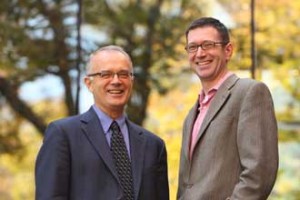
By Pascal Zamprelli
After six successful years as the founding Chair of the Joint Senate-Board Equity Subcommittee for Queer People (ESQP), Gregg Blachford, the Director of the McGill Career and Placement Service, will pass the reins to Professor Robert Leckey of the Faculty of Law.
Blachford oversaw the growth of the ESQP, which originally started as a working group in 2001 and became an equity subcommittee the following year. It consists of representatives from student groups, as well as professors, staff and alumni. Meeting once a month to discuss new ways to provide equity and improve queer life on campus, the ESQP mandate is to advise the Senate and make recommendations for changes and improvements.
Under Blachford’s leadership, the ESQP has led a number of successful initiatives, such as the inclusion of “persons of minority sexual orientations and gender identities” in the University’s employment equity policy; the creation of the Sexual Diversity Studies Minor program in the Faculty of Arts; increasing the ability of students and staff to use their preferred rather than legal names on McGill’s computer systems; and lobbying for greater availability of gender-neutral washrooms – single user facilities with no gender marker on the door.
Leckey has been involved with the committee since last year and hopes to build on Blachford’s accomplishments by pushing for more preferred name options on McGill computer systems, for instance, and by expanding Sexual Diversity Studies to a major program.
Leckey and his colleagues are pleased that Provost Tony Masi has agreed to fund a new half-time position, the Queer Outreach Advisor, who will work on programming and education for both staff and students. “This is a sign from the Provost that there’s an awareness that there’s work to be done for both students and staff on the McGill environment,” Leckey said, noting that the ESQP participated in drafting the job description, and plans to work closely with the Queer Outreach Advisor.
He hopes the new Advisor will play a role in administering the Safe Space Program, another ambitious project begun under Blachford that encourages professors to attend information workshops, and then to display a safe space symbol identifying their office or classroom as a queer-friendly environment.
Happily, instances of explicit homophobia on campus are increasingly rare, Leckey said, but certain more subtle forms of discrimination may persist.
“Most of the time these days it’s inadvertent,” he said. “Professors aren’t necessarily aware that the kinds of things they say in class or the examples they use do shape the environment in a way that excludes some students. Assumptions that everyone is heterosexual can just make students in their classrooms sort of feel invisible.”
While the situation at McGill is far better today than it once was, “there’s still space to get people to think about how even those little things make a difference,” Leckey said. “Full inclusion and full participation is not just the absence of explicit insults – it’s recognition and reaching out in all kinds of ways.”
